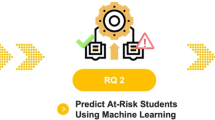Abstract
Machine learning is used in many contexts these days. And they’ve been integrated into the decision-making process in many critical areas, some applications including predicting at-risk students and automating student enrollment. From these applications, it is clear that machine learning models have a major impact on students’ professional success, therefore, it is imperative that the student performance model is well understood and free of any bias and discrimination. The kinds of decisions and predictions made by these machine-learning-enabled systems become much more profound and, in many cases, critical to students’ professional success. Various higher education institutions rely on machine learning to drive their strategy and improve their students academic success. Therefore, the need to trust these machine learning-based systems is paramount, and building a model that educational decision-makers who may not be familiar with machine learning can understand is critical. But sometimes, even for the experts in machine learning, it becomes difficult to explain certain predictions of the so-called “black box models”. Therefore, there is a growing need for easy interpretation of a complex black box model. Therefore, this study aims to provide a framework for an interpretable student performance model by introducing a local model-agnostic interpretability method shap value, which is a novel explanatory technique that explains the predictions of any classifier in an interpretable and faithful way by opening the black -box model and explaining how the final result came out and which parts of the model are responsible for certain predictions. By understanding how the student performance model works, education decision-makers can have a greater advantage and be smarter about what they should be doing.
Access this chapter
Tax calculation will be finalised at checkout
Purchases are for personal use only
Similar content being viewed by others
References
Adyatama, A.: Interpreting classification model with lime. 2 December 2019. https://algotech.netlify.app/blog/interpreting-classification-model-with-lime/
Amrieh, E.A., Hamtini, T., Aljarah, I.: Mining educational data to predict student’s academic performance using ensemble methods. Int. J. Database Theory Appl. 9(8), 119–136 (2016)
Chen, T., Guestrin, C.: XGBoost: a scalable tree boosting system. In: Proceedings of the 22nd ACM SIGKDD International Conference on Knowledge Discovery and Data Mining, pp. 785–794 (2016)
Choudhary, A.: Decoding the black box: an important introduction to interpretable machine learning models in Python, 26 August 2019. https://www.analyticsvidhya.com/blog/2019/08/decoding-black-box-step-by-step-guide-interpretable-machine-learning-models-python/
Explain your model with the shap values, 07 November 2019. https://towardsdatascience.com/explain-any-models-with-the-shap-values-use-the-kernelexplainer-79de9464897a
Interpretability in machine learning: looking into explainable AI, 21 September 2020. https://www.altexsoft.com/blog/interpretability-machine-learning/
Introduction to local interpretability models with lime and shap, 2 March 2020. https://aqngo.com/2020/03/02/local-interpretability.html
Jha, A.: Ml model interpretation tools: what, why, and how to interpret, 14 January 2022. https://neptune.ai/blog/ml-model-interpretation-tools
Kundu, A.: An overview of how different machine learning interpretability tools are used for interpretation, 29 November 2021. https://towardsdatascience.com/shap-explained-the-way-i-wish-someone-explained-it-to-me-ab81cc69ef30
Lykourentzou, I., Giannoukos, I., Nikolopoulos, V., Mpardis, G., Loumos, V.: Dropout prediction in e-learning courses through the combination of machine learning techniques. Comput. Educ. 53(3), 950–965 (2009)
Sahlaoui, H., El Arbi, A.A., Nayyar, A., Agoujil, S., Jaber, M.M., et al.: Predicting and interpreting student performance using ensemble models and Shapley additive explanations. IEEE Access 9, 152688–152703 (2021)
Solanki, S.: How to useLIME to understand sklearnmodels predictions?, 21 October 2020. https://coderzcolumn.com/tutorials/machine-learning/how-to-use-lime-to-understand-sklearn-models-predictions
Trevisan, V.: Using Shap values to explain how your machine learning model works learn to use a tool that shows how each feature affects every prediction of the model, 17 January. https://towardsdatascience.com/using-shap-values-to-explain-how-your-machine-learning-model-works-732b3f40e137#:\(\sim \):text=SHAP20values20(SHa
Xiaoqiang: Interpretable machine learning, 10 April 2019. https://easyai.tech/en/blog/interpretable-machine-learning/
Author information
Authors and Affiliations
Corresponding author
Editor information
Editors and Affiliations
Rights and permissions
Copyright information
© 2023 The Author(s), under exclusive license to Springer Nature Switzerland AG
About this paper
Cite this paper
Sahlaoui, H., Abdellaoui Alaoui, E.A., Agoujil, S. (2023). A Game Theoretic Framework for Interpretable Student Performance Model. In: Ben Ahmed, M., Abdelhakim, B.A., Ane, B.K., Rosiyadi, D. (eds) Emerging Trends in Intelligent Systems & Network Security. NISS 2022. Lecture Notes on Data Engineering and Communications Technologies, vol 147. Springer, Cham. https://doi.org/10.1007/978-3-031-15191-0_3
Download citation
DOI: https://doi.org/10.1007/978-3-031-15191-0_3
Published:
Publisher Name: Springer, Cham
Print ISBN: 978-3-031-15190-3
Online ISBN: 978-3-031-15191-0
eBook Packages: Intelligent Technologies and RoboticsIntelligent Technologies and Robotics (R0)




